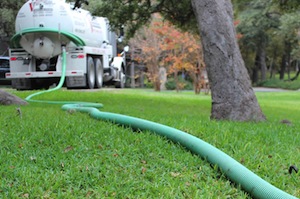For service call (210) 890-2778
or click here to request service
Septic Tank Pumping vs. Cleaning: What’s the Difference?

When it comes to septic tanks, the words “pumping” and “cleaning” are often used interchangeably, even though they mean slightly different things: pumping means removing liquid and some floating solids/sludge, while cleaning means removing all the water and compacted sludge from the bottom of the tank.
This difference might seem small, but it can make a big impact on your septic system’s performance. Here are a few things to look for to be sure you are receiving a thorough pumping and cleaning job.
Septic pumping vs. cleaning
All septic pumping companies remove sludge from your septic tank using a vacuum truck — but how thorough of a job they do depends on whether they “pump” or “clean” the septic tank.
Some companies insert their vacuum hose in the tank and only suck out the liquids (pumping). But the right way is to remove all the liquids and solids in the tank (cleaning).
Factors affecting septic cleaning
Infrequent pumping/cleaning
If your tank is pumped on a regular basis (every 3-5 years), the solids can be removed fairly easily. The thicker the sludge becomes, the harder it is to remove the solids.
Sometimes when the sludge is heavy, we have to add extra water to the tank or try to break down the solids with a high-pressure water nozzle in order to remove the solids.
Occasionally, we find solids so thick that they can’t be broken down. In these instances, re-pumping the tank in 6 -12 months is recommended.
Invading roots
Heavy roots become entangled with solids. If the roots can’t be removed, they and the entangled sludge remain in the tank.
Access lid size
If the access opening to the tank is only a few inches wide, the vacuum truck hose may not be able to reach the far sides of the tank.
Dividing walls
Septic tanks installed after the late 1980s have two compartments, and it is important to pump out both compartments each time.
The dividing walls in the tank are not always watertight, so it is possible to pump out almost all the liquids the tank holds, but still leave the solids in the compartment that is not cleaned out.
Most homeowners are unaware when their septic tank has two compartments; some companies use that to their advantage, charging to pump both sides of the tank but only actually pumping out one.
Choose a reliable provider
The challenges listed above not only affect how easy or difficult it is to clean a septic tank, but can also give an unscrupulous septic pumper an excuse to not clean your septic tank properly.
A septic system is an expensive thing to replace, so you must make sure it is properly taken care of. Research carefully when choosing a septic maintenance provider.
Not sure what to look for? Here’s questions to ask when getting your septic tank cleaned.
Need a septic tank cleaning?
We may use the words “pump” and “clean” interchangeably, but Van Delden technicians remove all solids from a septic tank when performing a cleaning (except in rare cases). We always check for roots and dividing walls to make sure we’re cleaning your septic tank properly.
Please call us at 210.698.2000 (San Antonio) or 830.249.4000 (Boerne) or contact us online to ask questions and schedule a septic cleaning.
